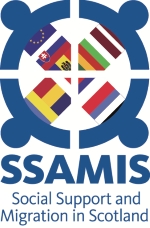 Experiences of Social Security and Prospects for Long Term Settlement in Scotland amongst Migrants from Central Eastern Europe and Former Soviet Union
Experiences of Social Security and Prospects for Long Term Settlement in Scotland amongst Migrants from Central Eastern Europe and Former Soviet Union
The five-year ESRC project ‘Social Support and Migration in Scotland’ (SSAMIS) was a collaboration between the University of Glasgow and Swansea University which ran from November 2013 to November 2018. It explored experiences of migration and settlement amongst Central and Eastern European (CEE) migrants living in urban and rural Scotland.
Researchers carried out extensive ethnographic fieldwork in two urban and two rural locations across Scotland, including migrant interviews, expert interviews, and ethnographic observations at key sites. This was followed by a period of participatory action research, where the SSAMIS team led initiatives at fieldwork sites with the aim of bringing key fieldwork findings on challenges migrants face into action in local Angus and Aberdeenshire communities – and beyond.
The data from this project can be found in the UK Data Service Reshare archive Ref. 10.5255/UKDA-SN-852584
These two main phases of the project have since been followed by two additional projects (on social integration and low-skilled labour migration in Scotland) by members of the SSAMIS team, which have expanded on its findings through further research, reports and media coverage. SSAMIS researchers have also continued to share key findings and work with service providers and policymakers at a local and national level.

Our Events & Initiatives

Research questions
In reflection of the aims and scope, the research will seek answers to the following questions:
- What is the range and combination of state and non-state structures, formal organisations and informal networks, public and private resources which migrants draw upon in order to mitigate risk and produce forms of ‘social security’?
- To what extent are migrant experiences and strategies relating to ‘social security’ shaped by emotional as well as material aspects of security and how do these relate to longer term intentions regarding settlement?
- How are migrant experiences and strategies relating to ‘social security’ and longer term intentions regarding settlement shaped by location and geographical scale?
- How are migrant experiences and strategies relating to ‘social security’ and their longer term intentions regarding settlement shaped by socio-economic diversity including the impacts of gender, class (occupation, education, professional history), citizenship, ethnicity, country of origin, language, migrant status, age?
- How can collaborations between a range of actors (migrants, policy makers, service providers) lead to improvements in policy responses and forms of service provision at local, regional and national levels in order to better accommodate migrants’ social security needs in a range of locations across Scotland?
Background
Our ESRC-funded research project prioritises the (often hidden) migrant voice in both its theoretical and empirical approach. It aims to study perspectives and experiences of 'social security' amongst migrants from Central Eastern Europe and the Former Soviet Union in Scotland. It began in November 2013 and will run for four years.
The UK has seen new flows of migration coming from Central Eastern Europe and other parts of the former 'Soviet bloc', particularly since EU accession processes in 2004 and 2007. Scotland, the focus for this research, presents a particularly interesting and distinctive case due to the specifics of its economic and demographic situation, the political discussion taking place of the need for migration, and the division of responsibilities between UK and Scottish parliaments and local authorities for migration. Whilst both the Scottish Executive and many local authorities have expressed a wish to attract and retain migrant workers, challenges have also been highlighted in academic and policy oriented research relating to a demand for and adequacy of service provision. Meanwhile the experiences and perspectives of migrants themselves remain little understood.
The project prioritises this often hidden migrant voice in both its theoretical and empirical approach. It aims to study perspectives and experiences of 'social security' amongst migrants from Central Eastern Europe and the Former Soviet Union in Scotland. We use 'social security' in a holistic sense to mean the ways in which migrants are able to make themselves socially, economically, personally and culturally secure in a new environment and their strategies for dealing with every day risks.
Aims and scope
- Over the course of the project we will examine the ways in which migrants' experiences and perspectives on 'social security' affect their longer term intentions regarding settlement in Scotland, whether this is a decision to stay, or a decision to move elsewhere.
- The project seeks to explore the ways in which migrants deal with everyday risks including those associated with migration and settlement and the processes by which they are able to make themselves socially, economically, personally and culturally secure in a new environment.
- Through a long-term and deep engagement with migrant communities, the project will deliver significant new and original empirical data. It will also focus on practical outcomes and policy relevance, in particular during a participatory action research (PAR) phase.
- The project will pay attention to various forms of diversity, both in terms of the migrants themselves and their location in Scotland.
- The research will be conducted in eight locations in Scotland: two cities (Glasgow and Aberdeen) two medium-sized towns (Peterhead and Arbroath) and four more remote rural locations in Aberdeenshire and Angus.
Our staff
Principal Investigator (PI)
- Professor Rebecca L Kay, University of Glasgow, Central and East European Studies (CEES)
Co-Investigators (Co-Is)
- Dr Moya B Flynn, University of Glasgow, CEES
- Dr Sergei Shubin, University of Swansea
Researchers
- Dr Paulina Trevena, University of Glasgow, CEES
- Dr Alexa Szoke, University of Swansea (currently on maternity leave)
- Dr Holly Porteous, University of Swansea
- Claire Needler, University of Swansea
Project administrator
- Bernadette Laffey, University of Glasgow




